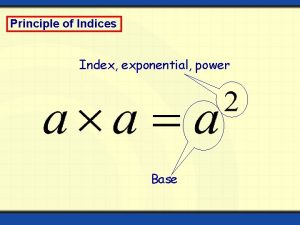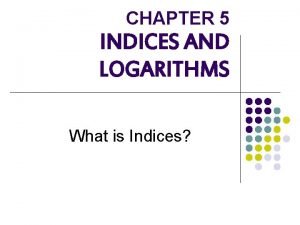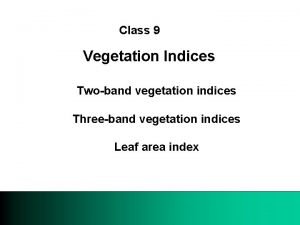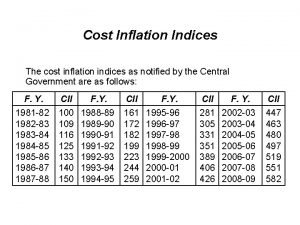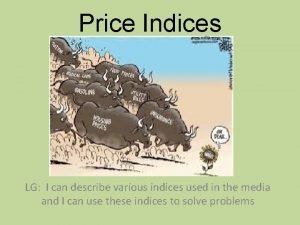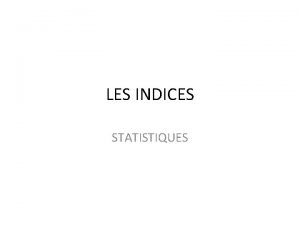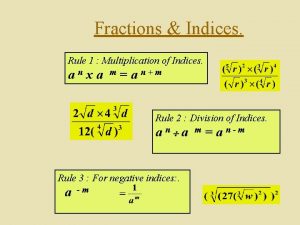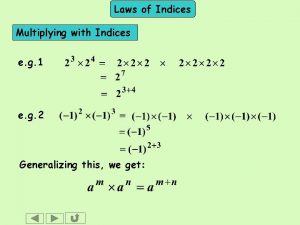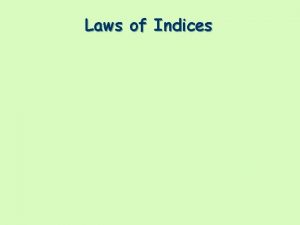Indices What is an index Like the index






























- Slides: 30

Indices

What is an index? Like the index in the back of a book (remember those? ), an index helps you find information quickly. Without an index, you would have to go through the entire book to find a particular topic. ◦ But with an index, you can look up the topic in a sorted area, and then jump to the topic you care about. Indices have no external effect on a database; they do not affect any of the other queries. ◦ But they do have a huge effect on performance. By default, every table is indexed according to its integer primary key. If there is no primary key, SQLite makes a hidden one called "rowid".

CREATE INDEX index_name ON students (name); You can add an index to a database with the above command CREATE INDEX index_name students (id, name); You can have multiple columns to sort your index on. DROP INDEX index_name; DROP INDEX IF EXISTS index_name; As always IF [NOT] EXISTS makes the CREATE/DROP a no-op if an table/view/index with that name already exists

When should you create an index? When you need to often look up rows, but not according to their primary key. An index on some columns in a table allows it to quickly get matching rows when doing a lookup on those columns. But, indices aren't always good, modifications to a table (UPDATE, INSERT, DELETE) all need to adjust the indices on the table, leading to slower performance for those operations. Also, indices take up memory, so large/multiple indices can take up valuable space in your database.

Query Planner The following content is taken from https: //www. sqlite. org/queryplanner. html. SQL is a declarative language, not a procedural language, meaning you write what you want to do, not how to do it. It is the job of the SQL implementation to interprete your declaration into actual steps to yield the answer. Most of the time the implementation can do this efficiently, but sometimes it needs you to create indices to make the operations you need done faster.

fruitsforsale CREATE TABLE fruitsforsale ( fruit TEXT, state TEXT, price REAL ); INSERT INTO. . . We didn't specify a INTEGER PRIMARY KEY, so a new column "rowid" was made for us as the INTEGER PRIMARY KEY. The table is always ordered according to the key.

fruitsforsale SELECT price FROM fruitsforsale WHERE fruit = 'Peach'; Without an index on fruit, we have to do a full table scan, meaning we must examine every row and check if fruit is equal to 'Peach'. This is very slow if you have thousands or millions of rows.

What is the Big O notation for a simple SELECT statement? (n is number of rows) n log(n) + log(n) Ooooh. . .

fruit_index CREATE INDEX fruit_index ON fruitsforsale(fruit); Now we have a index ordered by fruit so we can quickly find rows with a certain fruit value.

SELECT price FROM fruitsforsale WHERE fruit = 'Peach'; fruit_index fruitsforsale 1. Do a binary search in fruit_index for 'Peach', then we find the rowid. 2. Do a binary search in fruitsforsale for that rowid, then we can return the price.

What is the Big O notation for a lookup with an index? n log(n) + log(n) Ooooh. . .

SELECT price FROM fruitsforsale WHERE fruit = 'Orange'; fruit_index fruitsforsale 1. Do a binary search in fruit_index for 'Orange', then we find the rowid. 2. Do a binary search in fruitsforsale for that rowid, then we can return the price. 3. Go back to fruit_index and check if the next row is also an orange, if so look up its row in fruitsforsale. 4. Repeat until there are no more 'Orange's.

SELECT price FROM fruitsforsale WHERE fruit = 'Orange' AND state = 'CA'; fruit_index fruitsforsale Same process as before, but we have to exclude some of the 'Orange' rows if the state doesn't match 'CA'.

CREATE INDEX state_index ON fruitsforsale(state); state_index

SELECT price FROM fruitsforsale WHERE fruit = 'Orange' AND state = 'CA'; state_index fruitsforsale Using the state_index instead of the fruit_index follows the same process.

If you have multiple indices, which one is faster? The index with the most rows The index with the least duplicates The index that is sorted Depends (not the diaper)

CREATE INDEX fruit_state_index ON fruitsforsale(fruit, state); fruit_state_index Multi-column index that is sorted according to the first column (ties broken by subsequent columns.

SELECT price FROM fruitsforsale WHERE fruit = 'Orange' AND state = 'CA'; fruit_state_index fruitsforsale Using the fruit_state_index allows only finding the rows we want.

SELECT price FROM fruitsforsale WHERE fruit = 'Peach'; fruit_state_index fruitsforsale fruit_state_index has all of utility fruit_index had, we can just ignore the state if it isn't needed.

CREATE INDEX fruit_state_price_index ON fruitsforsale(fruit, state, price); fruit_state_price_index This is called a covering index - it has all of the columns used in the SELECT statement, including the output ('price').

SELECT price FROM fruitsforsale WHERE fruit='Orange' AND states = 'CA'; fruit_state_price_index A covering index for a query doesn't have to consult the original table, because all of the information is in the index. This means the second binary lookup isn't done.

What is the Big O notation for a lookup with an covering index? n log(n) + log(n) Ooooh. . .

SELECT price FROM fruitsforsale WHERE fruit='Orange' OR state='CA'; fruitsforsale fruit_index state_index This is called the OR-by-UNION technique.

SELECT * FROM fruitsforsale ORDER BY fruit; fruitsforsale If we didn't have an index, every row is passed to a sorter function.

What is the Big O notation for sorting without index? n log(n) Ooooh. . .

SELECT * FROM fruitsforsale ORDER BY rowid; fruitsforsale No sorting needed, just return the rows as they are. Can you imagine what happens with: "SELECT * FROM fruitsforsale ORDER BY rowid DESC; "

SELECT * FROM fruitsforsale ORDER BY fruit; fruits_index fruitsforsale Using the index, we don't have to pass everything to a sorted function

What is the Big O notation for sorting with an index? n log(n) Ooooh. . .

SELECT price FROM fruitsforsale WHERE fruit='Orange' ORDER BY state; fruits_state_index fruitsforsale If we are sorting and filtering, using a appropriate index is very fast. 1. Find rows with fruit='Orange' (left most column in index) 2. Output the price for each record (they are already sorted by state).

SELECT * FROM fruitsforsale WHERE fruit='Orange' ORDER BY state; fruits_state_price_index Using the appropriate covering index, we don't even have to do a lookup on the underlying table.
 Từ ngữ thể hiện lòng nhân hậu
Từ ngữ thể hiện lòng nhân hậu Trời xanh đây là của chúng ta thể thơ
Trời xanh đây là của chúng ta thể thơ Tư thế ngồi viết
Tư thế ngồi viết Thứ tự các dấu thăng giáng ở hóa biểu
Thứ tự các dấu thăng giáng ở hóa biểu Gấu đi như thế nào
Gấu đi như thế nào Thể thơ truyền thống
Thể thơ truyền thống Hổ sinh sản vào mùa nào
Hổ sinh sản vào mùa nào đại từ thay thế
đại từ thay thế Thế nào là hệ số cao nhất
Thế nào là hệ số cao nhất Diễn thế sinh thái là
Diễn thế sinh thái là Vẽ hình chiếu vuông góc của vật thể sau
Vẽ hình chiếu vuông góc của vật thể sau Frameset trong html5
Frameset trong html5 Thế nào là mạng điện lắp đặt kiểu nổi
Thế nào là mạng điện lắp đặt kiểu nổi Lời thề hippocrates
Lời thề hippocrates Mật thư anh em như thể tay chân
Mật thư anh em như thể tay chân Tư thế worm breton là gì
Tư thế worm breton là gì Vẽ hình chiếu đứng bằng cạnh của vật thể
Vẽ hình chiếu đứng bằng cạnh của vật thể Quá trình desamine hóa có thể tạo ra
Quá trình desamine hóa có thể tạo ra Sự nuôi và dạy con của hổ
Sự nuôi và dạy con của hổ điện thế nghỉ
điện thế nghỉ Các châu lục và đại dương trên thế giới
Các châu lục và đại dương trên thế giới Dot
Dot Nguyên nhân của sự mỏi cơ sinh 8
Nguyên nhân của sự mỏi cơ sinh 8 Bổ thể
Bổ thể Làm thế nào để 102-1=99
Làm thế nào để 102-1=99 Thiếu nhi thế giới liên hoan
Thiếu nhi thế giới liên hoan Hát lên người ơi
Hát lên người ơi Vẽ hình chiếu vuông góc của vật thể sau
Vẽ hình chiếu vuông góc của vật thể sau Một số thể thơ truyền thống
Một số thể thơ truyền thống Sơ đồ cơ thể người
Sơ đồ cơ thể người Tư thế ngồi viết
Tư thế ngồi viết
































